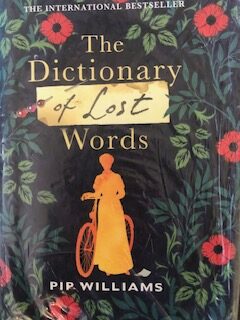Recently, I read the excellent novel, The Dictionary of Lost Words by Pip Williams. It is a fictional account, based on extensive research, of the making of the Oxford English Dictionary. The aim of the dictionary was to be the ultimate reference book on the English language. Samuel Johnson’s dictionary of a century before required an update. Woven within the tale are the events of the 71 years which passed from its inception to completion, including women’s suffrage and the First World War.
In addition to being a gripping narrative, it raised many questions about language, some of which I would like to explore here. Primarily, it questions who decides what is appropriate for the dictionary. Are these middle-class, educated men to be the arbiters of what is and is not English? And is ‘proper’ English more valuable than the endless dialects and colloquialisms of the common folk? The protagonist thinks not and creates her own dictionary of lost words.

Of course, I hear you say, a dictionary that contained all the words in use would never be complete, as words continually appear, or are used by only a fraction of people. But still. It is a conundrum.
Since most of us think in words (and images) and certainly communicate almost solely through language, the implications of this are great. I would argue that the person who controls the language of the people controls the thought. Throughout history, dictators and propagandists would agree and they have done their utmost to manipulate or eradicate language that does not fit their agenda.
With the rise of ‘fake news’, unregulated sources and pressure groups trying to push their own plans, these questions are ones we need to consider carefully. Within the next year, our Government in the UK and that in the US will be elected on the basis of their words. How do we know what to trust? How do we discern truth from fabulation?
Let us begin with a little history
Standardising English
Reading and writing of English was the preserve of the very wealthy and the religious elite. The arrival of the printing press in 1440 changed all that. Now it was possible to afford printed matter, though it would be some time before ordinary people could afford books of any quality. Protestantism was on the rise and individuals wanted to make their own study of the Bible and not simply listen to a priest’s interpretation.
Travel was also becoming more widespread and one of the aims of Cawdrey’s dictionary was to ‘fix’ some of the English words under threat from their continental neighbours and to explain what those more commonly used actually meant.

His intention was noble: to enable the reader to better understand texts. He applied the revolutionary idea of presenting words in alphabetical order to assist in finding them. And so, the beginning of the standardisation of the English language was born. Questions of spelling and usage now had a source to reference. No longer would spellings be based arbitrarily on how one felt that day.
Johnson’s dictionary followed over a century later and numerous grammars were written to aid in the teaching of the burgeoning educated populace. From here on, dictionaries in English have grown exponentially.
Prescriptivism v descriptivism
But the question remained and has perplexed linguists ever since as to whether language can ever be fixed: prescribed, or if it is a fluid, living thing that can only be described as it morphs from one year to the next. If Standard English is ‘good’ does that make colloquial English ‘bad’? Is it merely another way of establishing power or control over others?
When teaching in South Carolina, I taught many excellent students who spoke and wrote in what is referred to as Black American English. Their writing and spelling was consistent, but it was not in line with Standard English. When they spelled ‘ax’ for ask, I was forced to ‘correct’ them, citing that Standard English was the one used in academia. I felt bad doing so, but I was fully aware that if they did not use the ‘correct’ form, their academic performance would be penalised for it. At the time, it made me feel rather uncomfortable. It still does.
That said, at some point we do need to establish some ground rules if people are to understand one another at all. With my own students, I tried to encourage them to see correct spelling and grammar not as the enemy but a way of facilitating their communication.
Of course, I try to follow the rules here too. After all, I want what I write to be as intelligible as possible to as large an audience as possible. Our education system has chosen the form in which I write, but I think there is room for reflection here also if only to remind ourselves that language, after all, is power.
Part 2 will look at the abuse of this power.

Do you mind if I quote a few of your posts as long as I provide credit and sources back to your weblog? My blog is in the very same area of interest as yours and my users would genuinely benefit from a lot of the information you provide here. Please let me know if this alright with you. Thanks a lot!
look at my page
http://forum.altaycoins.com/viewtopic.php?id=589804 crema naturale per dolori articolari
http://forum.prolifeclinics.ro/profile.php?id=991436 crema cortisonica per dolori articolari
https://flowersandcents.com/forums/users/fjqcaren59149/ dolori alle articolazioni rimedi
https://academy.theunemployedceo.org/forums/users/rtomarietta/ migliore pomata per dolori articolari
https://dleweb.ru/user/MarilynnNivison/ cura per dolori articolari
@776=
You are very welcome to cite any posts, just please credit the source. Thank you.
Hello dear Karen! Great blog this week as usual!
I too thoroughly enjoyed the book.
A friend and I recently went to see it on stage in Melbourne. It was a beautifully executed adaptation. I would have thought it to be a difficult task to convey the plot in a theatrical sense, but the ‘set’ was incredibly cleverly designed and characters well portrayed.
Is it on in the UK?
Hi Lys, so glad you enjoyed it. I am rather jealous that you got to see it on stage! She is an Australian writer, so perhaps you got first dibs!
I shall look our for it in the UK. It deserves all the success it can get.
I’ll tell Deirdre – she’s doing it for her book club.
Lots of love, Karen x